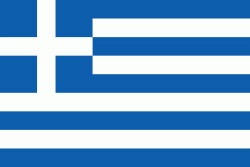Thessaloniki Prefecture (Nomós Thessaloníkis)
The regional unit stretches from the Thermaic Gulf in the southwest to the Strymonic Gulf in the east. Two bodies of water are located in the north, Lake Koroneia in the heart of the regional unit and Lake Volvi in the east. There are farmlands throughout the west and southwest, with fewer in the northeast, north and along the Axios River valley. Mountainous areas include the Chortiatis in the west-central part, the Vertiskos in the north and parts of the Kerdylio mountains in the northeast. The regional unit borders on the Imathia regional unit to the southwest, Pella to the west, Kilkis to the north, Serres to the east and Chalkidiki to the south.
Its climate includes hot Mediterranean summers and cool to mild winters in low-lying areas and plains. Winter weather is very common in areas 500m above sea level and into the mountains.
Map - Thessaloniki Prefecture (Nomós Thessaloníkis)
Map
Country - Greece
 |
 |
| Flag of Greece | |
Greece is considered the cradle of Western civilization, being the birthplace of democracy, Western philosophy, Western literature, historiography, political science, major scientific and mathematical principles, theatre and the Olympic Games. From the eighth century BC, the Greeks were organised into various independent city-states, known as poleis (singular polis), which spanned the Mediterranean and the Black Sea. Philip II of Macedon united most of present-day Greece in the fourth century BC, with his son Alexander the Great rapidly conquering much of the ancient world, from the eastern Mediterranean to the North Western parts of India. The subsequent Hellenistic period saw the height of Greek culture and influence in antiquity. Greece was annexed by Rome in the second century BC, becoming an integral part of the Roman Empire and its continuation, the Byzantine Empire, which was culturally and linguistically predominantly Greek.
Currency / Language
| ISO | Currency | Symbol | Significant figures |
|---|---|---|---|
| EUR | Euro | € | 2 |
| ISO | Language |
|---|---|
| EN | English language |
| FR | French language |
| EL | Greek language |
















